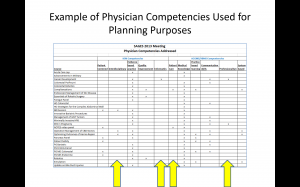The ACCME’s PARS – Program and Activity Reporting System
Ready or not, it’s time to get ready for another year of data input into PARS. PARS is the online data input system all ACCME providers and soon, all state providers, must use to input detailed date regarding their CME program. It’s a lot of data.
What happens to all of this data? Why are we, providers, required to enter so much information (even more in 2014!)
According to the ACCME, the data entered “will provide a more detailed and comprehensive picture of the national CME enterprise and assist the ACCME, accredited providers and other stakeholders in demonstrating the value and scope of CME.”
My opinion is that much of this data probably is useful to the ACCME behind the scenes, in the way that providers’ individual activity data can be useful as a guide to the development of overall educational curriculum. (See my post about Criterion 6 as an example of this.)
However, I think it’s providers who ultimately will need to make the argument on behalf of accredited CME. I want to call out a fantastic presentation from the recent Alliance for CE in the Health Professions Annual Conference. I didn’t get t see it live, but I saw a Tweet from Erik Brady, PhD about it, and so I downloaded the slides when I got home.  The talk is titled, “Estimating Healthcare Cost Savings Resulting from CME Activities Using the Outcomes Impact Analysis Model.” It was presented by Dana Ravyn, PhD, MPH, Scientific Director, and Rob Lowney, BA, MBA, Managing Director, CMEology, West Hartford, CT, West Hartford, Connecticut. In a nutshell, “CME-related learning, when favorably affecting clinical practice, can yield substantial cost savings…” in this instance, over $5 MILLION as a result of the decrease in surgical bleeding-related complications and reoperation for bleeding.
$5 MILLION!Â
How would you like to walk into your Director or CEO’s office and tell them you can potentially save your organization millions??? Obviously, we have a ways to go before we get there. But in the meantime, kudos to CMEology, don’t forget to enter your data into PARS, and then let’s get to work!

